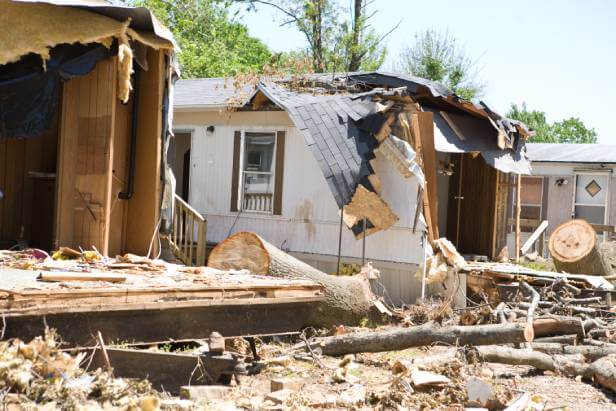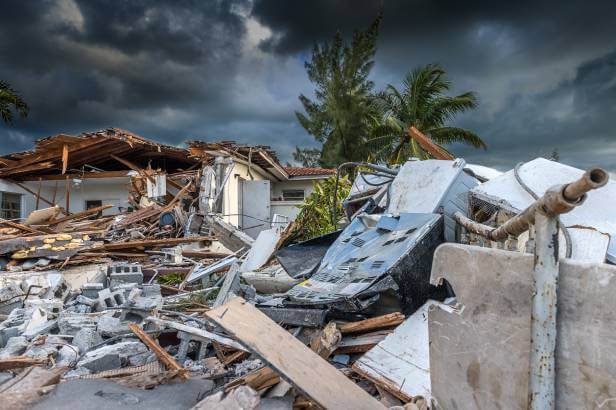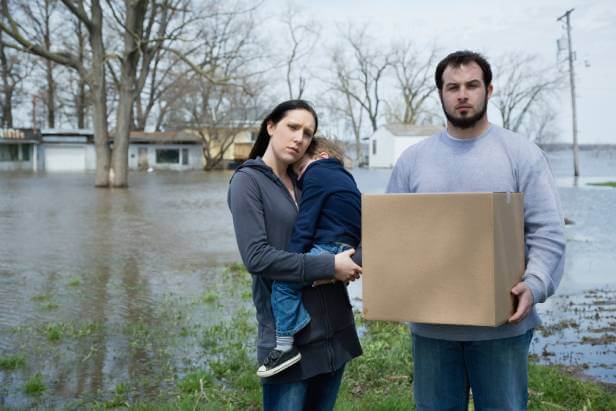When severe weather damages your rental property, your landlord may issue an eviction notice if the property becomes uninhabitable or if repairs are too costly. However, tenants should be aware that eviction is a legal process, and landlords must follow specific state regulations.
In many cases, landlords are required to provide reasonable notice and follow proper procedures when requesting tenants to vacate a damaged property. Tenants should ensure they fully understand the terms of their lease agreement and stay informed about their rights, which vary by state.
It’s always helpful to have professional legal guidance you can trust to help you avoid or overcome complexities specific to your situation.
Common reasons for eviction after storm damage
 A significant storm’s aftermath can ripple into various aspects of your life, creating unexpected complications, including an eviction. Let’s explore some common reasons renters may receive an eviction after a natural disaster.
A significant storm’s aftermath can ripple into various aspects of your life, creating unexpected complications, including an eviction. Let’s explore some common reasons renters may receive an eviction after a natural disaster.
- Uninhabitable property: Extensive storm damage might make your rental home unsafe or unsuitable for living, prompting your landlord to terminate the lease.
- Lease clauses for natural disasters: Some rental agreements have specific clauses that outline what happens when the property is damaged in a natural disaster, such as allowing for lease termination.
- Rent payment issues: While a storm may cause disruptions, rent is often still due, and failure to pay on time could lead to an eviction notice.
Understanding these situations can help you take action, like discussing your lease terms with your landlord or exploring other housing options. If you’re unsure about how your lease addresses such scenarios, professional legal guidance can provide clarity on your rights as a tenant.
Protecting your tenant rights
As a tenant, you have legal protections that ensure you aren’t unfairly evicted, even after storm damage. While landlord-tenant laws vary by location, they often require landlords to provide safe and habitable living conditions. If your rental home becomes unsafe due to a storm, it may be your landlord’s responsibility to make repairs or allow you to break your lease without penalty.
Some states offer additional protections, preventing landlords from unfairly evicting tenants or bypassing due process. Understanding your rights as a renter and knowing where to seek assistance is essential. While the eviction process can be complex, there are services available to help renters navigate these challenges and ensure their rights are protected. What can you do if you receive an eviction notice after storm damage?
If you find yourself in this situation, these steps can help you stay informed and protected:
- Review the eviction notice: Make sure you understand the reason for the eviction and the timeline involved. Is your landlord following proper legal procedures? Research your state or city’s eviction laws, which typically outline required notice periods, reasons for eviction, and legal steps landlords must follow. Many local government websites or housing authorities provide this information.Tip: Look at your lease agreement to see if it contains any specific provisions about eviction or property damage after a natural disaster.
- Communicate with your landlord: In some cases, early and open communication with your landlord can lead to alternative solutions, such as negotiating a temporary housing arrangement while repairs are made.
- Get professional legal guidance: There is legal help for renters after a hurricane. If you feel overwhelmed or uncertain about your next steps, it can be beneficial to consult with a lawyer who understands renter eviction laws. Professional legal guidance helps ensure that your rights are respected, and you know your options.
Key resources for renters facing eviction after significant storm damage
 If you’re facing eviction due to storm damage, having access to resources can make all the difference. Explore these:
If you’re facing eviction due to storm damage, having access to resources can make all the difference. Explore these:
- Federal Emergency Management Agency (FEMA): FEMA provides assistance for renters affected by natural disasters, including temporary housing and recovery support.
- Local tenant advocacy groups: Many local organizations provide guidance and assistance for renters dealing with eviction or housing issues after a storm. Tip: keyword search your state, followed by ‘tenant advocacy group storm eviction.’
- State Housing Authorities: State housing departments often provide resources for tenants facing eviction, including access to emergency housing and other forms of assistance. Tip: Keyword search your state, followed by ‘state housing authority storm eviction.’
Take the next step!
Storm damage can be overwhelming, but there are steps you can take to protect your tenant rights and avoid eviction. It’s important to understand the eviction process, review your lease agreement, and explore available resources to ensure you’re making informed decisions. There are several resources available to help renters facing eviction after a storm, including FEMA, local tenant advocacy groups, and state housing authorities. These organizations provide legal guidance and temporary housing solutions.
Whether it’s communicating with your landlord or seeking professional legal help, as a renter, you have options for navigating these challenges.
Consider these resources:
- Ongoing legal support: LegalShield’s flexible legal plan benefits can help you solve and prevent problems with your landlord. Compare Personal and Family Legal Plans.
- Experienced provider lawyers: Our experienced provider lawyers are here to advise you on how and when to exercise your rights—empower yourself to push back.
- More natural disaster resources: Get answers to frequently asked legal questions that arise from hurricanes and storms.
Pre-Paid Legal Services, Inc. (“PPLSI”) provides access to legal services offered by a network of provider law firms to PPLSI members through membership-based participation. Neither PPLSI nor its officers, employees or sales associates directly or indirectly provide legal services, representation, or advice. The information made available in this blog is meant to provide general information and is not intended to provide legal advice, render an opinion, or provide a recommendation as to a specific matter. The blog post is not a substitute for competent legal counsel from a licensed professional lawyer in the state or province where your legal issues exist, and you should seek legal counsel for your specific legal matter. Information contained in the blog may be provided by authors who could be a third-party paid contributor. All information by authors is accepted in good faith, however, PPLSI makes no representation or warranty of any kind, express or implied, regarding the accuracy, adequacy, validity, reliability, availability, or completeness of such information.


